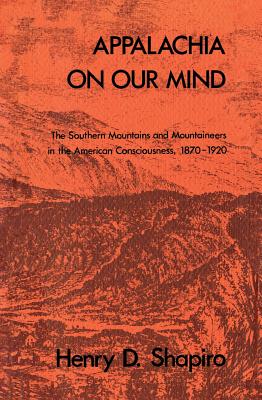Appalachia on Our Mind: The Southern Mountains and Mountaineers in the American Consciousness, 1870-1920

Appalachia on Our Mind: The Southern Mountains and Mountaineers in the American Consciousness, 1870-1920
Between 1870 and 1900, it became clear that the existence of the "strange land and peculiar people" of the southern mountains challenged dominant notions about the basic homogeneity of the American people and the progress of the United States toward achiving a uniform national civilization. Some people attempted to explain Appalachian otherness as normal and natural -- no exception to the rule of progress. Others attempted the practical integration of Appalachia into America through philanthropic work. In the twentieth century, however, still other people began questioning their assumptions about the characteristics of American civilization itself, ultimately defining Appalachia as a region in a nation of regions and the mountaineers as a people in a nation of peoples.
In his skillful examination of the "invention" of the idea of Appalachia and its impact on American thought and action during the early twentieth century, Mr. Shapiro analyzes the following: the "discovery" of Appalachia as a field for fiction by the local-color writers and as a field for benevolent work by the home missionaries of the northern Protestant churches; the emergence of the "problem" of Appalachia and attempts to solve it through explanation and social action; the articulation of a regionalist definition of Appalachia and the establishment of instituions that reinforced that definition; the impact of that regionalistic definition of Appalachia on the conduct of systematic benevolence, expecially in the context of the debate over child-labor restriction and the transformation of philanthropy into community work; and the attempt to discover the bases for an indigenous mountain culture in handicrafts, folksong, and folkdance.
PRP: 441.75 Lei
Acesta este Prețul Recomandat de Producător. Prețul de vânzare al produsului este afișat mai jos.
397.57Lei
397.57Lei
441.75 LeiIndisponibil
Descrierea produsului
Between 1870 and 1900, it became clear that the existence of the "strange land and peculiar people" of the southern mountains challenged dominant notions about the basic homogeneity of the American people and the progress of the United States toward achiving a uniform national civilization. Some people attempted to explain Appalachian otherness as normal and natural -- no exception to the rule of progress. Others attempted the practical integration of Appalachia into America through philanthropic work. In the twentieth century, however, still other people began questioning their assumptions about the characteristics of American civilization itself, ultimately defining Appalachia as a region in a nation of regions and the mountaineers as a people in a nation of peoples.
In his skillful examination of the "invention" of the idea of Appalachia and its impact on American thought and action during the early twentieth century, Mr. Shapiro analyzes the following: the "discovery" of Appalachia as a field for fiction by the local-color writers and as a field for benevolent work by the home missionaries of the northern Protestant churches; the emergence of the "problem" of Appalachia and attempts to solve it through explanation and social action; the articulation of a regionalist definition of Appalachia and the establishment of instituions that reinforced that definition; the impact of that regionalistic definition of Appalachia on the conduct of systematic benevolence, expecially in the context of the debate over child-labor restriction and the transformation of philanthropy into community work; and the attempt to discover the bases for an indigenous mountain culture in handicrafts, folksong, and folkdance.










